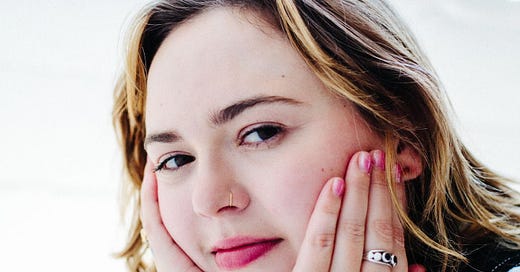Want to hear Paulina read this essay? Hit play here:
For a long time, my story was one of “mutating-ism,” a constant shape-shifting of substances and behaviors that filled whatever void I was feeling. My drug of choice evolved over the years, but marijuana—seemingly benign—was what ultimately brought me to my knees.
Growing up, my father often warned us: “When you start using, your brain stops developing.”
He wasn’t just a concerned parent—he was the Chief of Medical Staff at a rehabilitation center. His warnings felt real, not theoretical. One of my earliest memories is watching a heroin addict have a meltdown in the nurses’ station of that rehab, a visceral experience that instilled in me a deep fear of drugs and alcohol. Terrified of substances, I repeated these warnings to my friends, so I didn’t get invited to parties.
I spent my childhood under a heavy cloud of expectations. I was a competitive figure skater, up before dawn to hit the rink before school; perfectionism ruled every aspect of my life. I was surrounded by brilliance—the children of NASA scientists, CalTech professors, and the physically talented girls I skated with, who were homeschooled and spent their entire days training. I knew I couldn't be the best, but that didn’t stop me from trying. I felt immense pressure, and I had to find a way to relieve it.
My first “high” was the intoxicating rush of crushes. It came easy to me, the attention of boys. I always had someone to fixate on, whether it was a boy in class or someone to instant message late into the night while doing homework. But as I cycled through the list of every good candidate in my class, I lost interest. Control became my next drug of choice.
In the sixth grade, after years of being told I was fat, I was told I needed to lose weight if I wanted to continue skating competitively. I was sent to a nutritionist who handed me the keys to the kingdom—the tools to starve myself. I learned about carbs and calories, and with this knowledge came a new kind of power: the power to shrink. The more I shrank, the more praise I received. My jumps on the ice got higher, my school clothes smaller, and boys noticed me even more. With every pound lost, I felt more in control.
But the hunger was more than physical. My eating disorder allowed me to alter my consciousness, to shift the focus from my inner turmoil to the never-ending hunger. I became an open nerve, high strung; skating before school, attending dance during school, and cheering at practices after school. I averaged four hours of exercise a day while drinking six Diet Cokes and never more than 1,200 calories. Carbs were the enemy. I was slowly unraveling, but you’d never know it. The veneer of control—however illusory—kept me alive.
Secrets sustained me: the pint of ice cream I would buy on my way home from school; the fact that I was doing more than just kissing my high school boyfriend; the purging after a perceived “mistake” to rid myself of the anxiety.
But, of course, it wasn’t sustainable. I began to lose control, spiraling into binges and gaining weight, all while vowing to never let it happen again. Just like addiction, dieting was never going to become a sustainable means of control.
Then, alcohol arrived: I came late to the party, but once I started drinking, I went fast and hard. December of my senior year, I went shot-for-shot with a college freshman in her bedroom, and I found myself projectile vomiting into her toilet in the middle of the night. That night, “Barflina” was born—a nickname bestowed on me because, without fail, I would either blackout or vomit every time I drank.
Alcohol let me forget all the things my father had taught me about substances. At last, I was invited to the parties—I became the life of the party. But the cost was high: hangovers that lasted for days, blackouts that erased memories. Yet, I did not think to stop. The summer before college, I would drink Bud Lites nightly, blacking out more times than I could count. Once saying to a friend, “I think I’m allergic to alcohol” before vomiting and passing out early for the night.
College was no different. I moved cross-country to New York City, where I drank and ate, drank and purged. The freshman fifteen quickly arrived, and my eating disorder, once celebrated in the context of figure skating, was now a hidden shame. After purging eight times in one day, I had my first moment of clarity and started therapy for my eating disorder.
But as my therapy progressed, my drinking accelerated. At my Ivy League college, binge-drinking was a rite of passage, an expectation. A red flag to be laughed at. And so I drank to fit in, drank to forget, drank to let out my feelings (at inappropriate times). Spring of my senior year, I blacked out and broke my foot while pretending to do parkour at a school festival. A week later, I slipped in a lecture hall and broke my other foot. Yet, not once did it occur to me that alcohol could be the problem.
After graduation, I moved to Chicago, then back to New York for graduate school. And that’s when I found my true drug of choice: marijuana.
My boyfriend at the time introduced me to it, and it felt like the solution. I had started getting migraines—no longer purging my feelings, they were detonating in my skull—and weed seemed to ease the pain, or at least re-conceptualize it. More than anything, it allowed me to eat without thinking. I wasn’t feeding hunger; I was filling the gaping-black hole inside of me.
At first, it was magic. Then it became medicine. But eventually, it became misery. For five years, I smoked every day. Drinking happened no more than four nights a week because I physically could not sustain more. Weed consumed my life effortlessly, weed made way for me to dabble in other substances because, why not? I had convinced myself that my dad must be wrong.
The turning point came during the pandemic. My boyfriend at the time, a self-described “psychonaut,” moved in with me, and together we descended deeper into our addictions. Weed became edibles, edibles became dabs, and long before he moved in, we were taking research chemicals from the Netherlands on weeknights. There wasn’t a drug I wouldn’t try.
In December of 2021, we decided to do a “Sober Christmas,” mostly because we ran out of weed. As we drove from New York to New Orleans, my fiancé spiraled into weed-induced psychosis. It was my first experience with weed-induced psychosis, but it wouldn’t be my last. After three days of being trapped in a car with him—listening to him scream at me, no longer numbed by weed—I fell to my knees outside an Alabama gas station, having a full-blown panic attack.
It was the worst thing that had ever happened to me, but also the best. That moment revealed my darkest secret: I could no longer hide my addiction. I ended my engagement, moved back in with my parents, and got sober.
After my moment of clarity, scream-crying on a patch of grass outside of an Alabama gas station, I flew back to Los Angeles on an emergency flight and landed at LAX on December 20th. Two days later, on Christmas Eve, I went to my first 12-step meeting. And I have been sober ever since.
My journey to sobriety is not simple, but it does not have to be simple to be true. Around 70 days into my sobriety, I felt compelled to document my experience, and that’s when I started
on Substack. I’ve been writing about my sobriety ever since.In the beginning, it was hard to tell people I was a marijuana addict. The response was almost always, “But weed isn’t addictive.” But I knew the truth: I couldn’t stop smoking, and I wasn’t alone in that struggle. THC levels are so high in today's products that people are experiencing severe psychiatric consequences, yet the narrative around legalization insists that weed is harmless.
Today, I live by the maxim “Grow or Die.” When I was smoking weed every day, I was choosing death, stagnation, numbness. But now, because I am sober from all mind-altering substances, I choose growth. And I continue to choose growth, one day at a time.
Now you.
We’d love for you to share in the comments:
Has your “drug of choice” shifted over time? What role has this played in your recovery and sobriety?
What was the turning point for you, when you realized you were addicted to a substance or behavior and knew you needed to quit?
And if you found this article helpful, please tap the little heart. It lets others know there’s something useful here and will help us grow this community.
Want to be published on Sober.com? If you’re a sober writer, we invite you to contribute! Reach out to hello@danaleighlyons.com for details.






So much recognition for your clarity, honesty, and sobriety, Paulina. I especially appreciate your awareness around how your drug of choice and addictive patterns shifted over time.
I’ve always considered anorexia and obsessive-compulsive patterning my primary drugs of choice; for me, recovering from those was much harder than quitting alcohol. And I’m still deeply addicted to external validation, so I guess that’s my drug of choice these days - thankfully, it’s far less destructive than my previous addictions. Always another layer to explore...
Really loved this piece and I can relate to so much of your story. Strict parents, perfectionism, ice skating!
I myself loved alcohol from the very beginning, it gave me courage and numbed me and for years it worked pretty well. Of course, I was also a black out drinker and those nights became more frequent the older I got. I think I knew at around 27 years old that I had a serious problem but I wasn’t ready to do anything about it, other than divorce my also alcoholic husband.
I also loved weed but as I got older that quit being relaxing and started to make me paranoid. The divorce coincided with my ability to give that up almost instantly.
Finally at 35 I was ready to test out living life alcohol free. It took me a couple of “30 day challenges” but eventually it clicked and I’ve been sober since June of 2020!